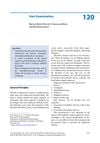 2 citations,
January 2022 in “Journal of Cosmetic Dermatology”
2 citations,
January 2022 in “Journal of Cosmetic Dermatology” QR678 Neo® is a safe and effective treatment for hair loss in men and women.
1 citations,
June 2018 in “Pharmaciana” The hair tonic with 15% ethanol effectively promotes hair growth.
The trichotillometer is a simple, effective tool for diagnosing and assessing female pattern hair loss.
 56 citations,
December 2011 in “Steroids”
56 citations,
December 2011 in “Steroids” The document suggests treating individuals with nonclassic congenital adrenal hyperplasia who show symptoms, especially those related to excess male hormones.
 January 2015 in “Springer eBooks”
January 2015 in “Springer eBooks” Understanding hair structure and growth is key for diagnosing hair diseases accurately.
18 citations,
January 2019 in “International Journal of Trichology” PRP therapy works better than minoxidil for treating hair loss.
 August 2019 in “Journal of The American Academy of Dermatology”
August 2019 in “Journal of The American Academy of Dermatology” RV3466F lotion significantly reduces hair loss and improves acute telogen effluvium.
 5 citations,
January 2015 in “Current problems in dermatology”
5 citations,
January 2015 in “Current problems in dermatology” The document concludes that a thorough history, physical exam, and specific tests are crucial for diagnosing and managing hair loss effectively.
1 citations,
December 2021 in “Journal of Cosmetic Dermatology” PRP treatment effectively reduces hair loss after COVID-19.
June 2024 in “Lontara Journal Of Health Science And Technology” Candlenut oil alone promotes the most hair growth.
The 10% hibiscus leaf extract hair tonic promotes better hair growth than 2% minoxidil but can irritate eyes.
 31 citations,
January 1989 in “Clinical and Experimental Dermatology”
31 citations,
January 1989 in “Clinical and Experimental Dermatology” The study tested a hair treatment and found it can help grow hair, but won't stop baldness. It's safe and works well, but needs more testing.
 7 citations,
January 2010 in “Pharmacognosy Research”
7 citations,
January 2010 in “Pharmacognosy Research” The tobacco leaf extract may help hair grow and could treat hair loss.
 2 citations,
March 2021 in “Journal of Cosmetic Dermatology”
2 citations,
March 2021 in “Journal of Cosmetic Dermatology” Umbilical cord-derived media is safe and effective for hair growth.
 January 2011 in “Medicina interna de México”
January 2011 in “Medicina interna de México” The document concludes that treating the underlying causes of telogen effluvium usually results in hair regrowth.
 7 citations,
July 2022 in “Pharmaceutics”
7 citations,
July 2022 in “Pharmaceutics” The microneedle device with rapamycin and epigallocatechin gallate effectively promoted hair regrowth in mice.
 April 2024 in “Journal of translational medicine”
April 2024 in “Journal of translational medicine” MJ04, a new compound, effectively promotes hair growth and is a potential topical treatment for hair loss.
 January 2024 in “Cosmetics”
January 2024 in “Cosmetics” HAIR & SCALP COMPLEX may help treat hair loss by stimulating hair growth and restarting the hair cycle.
September 2023 in “Pharmaceutics” The new face mask with Eflornithine can potentially reduce facial hair growth and moisturize skin.
 April 2020 in “Journal of the Endocrine Society”
April 2020 in “Journal of the Endocrine Society” A rare ovarian tumor that produced testosterone caused a blood clot in the lungs and increased red blood cells in a woman.
 5 citations,
October 2013 in “Endocrine”
5 citations,
October 2013 in “Endocrine” Blood tests can detect ovarian Leydig cell tumors when scans don't, and surgery can confirm and treat these tumors.
10 citations,
January 2019 in “Journal of the American Academy of Dermatology” Testosterone increases hair growth and acne in transgender men.
 49 citations,
February 2009 in “Maturitas”
49 citations,
February 2009 in “Maturitas” Short-term testosterone therapy in women seems safe with few mild side effects, but long-term effects need more research.
147 citations,
October 2004 in “Experimental dermatology” Hormones like testosterone affect skin functions and can cause skin issues when in excess; treatments to manage these effects are only somewhat effective.
1 citations,
January 2016 in “Companion animal” Cats lose hair due to itching or health issues, needing various tests for diagnosis.
 March 2021 in “Bioscientia medicina”
March 2021 in “Bioscientia medicina” Androgens like testosterone affect oil production and hair growth in skin and hair follicles.
 6 citations,
October 1993 in “The journal of the Royal Society of Health”
6 citations,
October 1993 in “The journal of the Royal Society of Health” Children's hair loss has many causes and requires careful diagnosis and personalized treatment, including emotional support.
May 2024 in “Jurnal Penelitian Farmasi dan Herbal” Green tea leaf extract at 7.5% concentration effectively promotes hair growth, similar to minoxidil.
 January 2012 in “Postgraduate obstetrics & gynecology”
January 2012 in “Postgraduate obstetrics & gynecology” Up to half of women by age 50 experience significant hair loss, with various types and treatments available.
16 citations,
September 1990 in “Fertility and sterility” Ketoconazole can treat ovarian hyperandrogenism but should be used cautiously with monitoring and birth control.

















